- Home
- Paul Fraser Collard
The True Soldier: Jack Lark 6 Page 15
The True Soldier: Jack Lark 6 Read online
Page 15
‘There is a difference, I will say, between our Southern brothers and ourselves, in that while we love our state with the true love of a son, we love the Union, and the country, with equal devotion. We place no state rights above or beyond the Union. To us our country is first, because it is our country, and our state is next and second. Our oath of allegiance to our country and that to our state are intertwined harmoniously, and never come into conflict. He who does his duty to the Union does his duty to the state, and he who does his duty to the state does his duty to the Union, one inseparable, now and for ever. The Union shall and must be preserved.’
With this the crowd went wild. Their shouts and cries had built steadily as the Governor spoke, and now they were released. It went on for several minutes, the noise washing over the men of the 1st Boston. The Governor again stepped back from his place at the front of the stage, and stood there laughing and even wagging a finger at the crowd as if it were a misbehaving child. The cheers doubled in intensity then, the crowd playing along, until eventually the Governor managed to calm them once again and returned to his spot at the very front of the stage.
‘Now this day I shall put into your hands the ensign of this commonwealth. I would have you recognised wherever you go as coming from this great state of ours. When you look upon this venerable flag, you will think of your homes and your families here in Massachusetts. Take it as a pledge from the state of the affectionate care of your kindred and homes, and of the sincere and undying interest its people feel for you. In the utmost confidence in your patriotism and valour, we send you forth as citizens of Massachusetts, assured that her honour will never be disgraced by any one of you.’
This time the inevitable cheers were almost drowned out as the Drum Corp rattled into life. Yet the crowd kept going as three sergeants approached to collect the flag that was being brought to the front of the stage, ready to be passed into the hands of the Governor. The men, all of whom came from the ranks of the 6th, marched smartly towards a series of steps set into one corner of the stage. They clearly knew their drill, and they kept their backs straight and their faces impassive even as the crowd grew louder and more raucous.
Suddenly the leftmost of the three men stumbled. His toe caught the lip of the second step and he lurched forward, grabbing at his companion to avoid a fall. For one single heartbeat the crowd was silenced, the moment marked by every person who saw it. Then, as if goaded by their own negative reaction, the cheering returned louder than before, the crowd making up for their own slip by redoubling their efforts to drown out the Drum Corp.
If the Governor saw the stumble, there was no trace of reaction in his expression as he collected the flag then presented it to the men now charged with its care.
For the first time that day, Jack felt the stirring of emotion. He knew what it was to go into battle following the colours, and the sight of the new flag awoke something hidden deep inside him. There was splendour in the gaudy square of silk. To the men who would follow it into battle, it represented the pride of the regiment. Men would fight for their colours, would die to prevent them falling into the hands of the enemy.
He doubted if any of those around him felt the same. These new soldiers did not yet understand the power of the flag. They might recognise its splendour, or see it as a fitting decoration for their regiment. But they could not yet know what it would be like to see the same colours ravaged by gunfire, dulled by powder smoke and stained with the blood of the men who had died carrying them. They could not envisage the desperation with which men would fight to keep those colours flying.
Jack shivered. He was surrounded by a great carnival, the celebration of a city proud of its endeavour and certain of its future. Yet whilst others cheered, he smelled the bitter tang of battle, his mind replaying the full horror of war, and saw again the faces of the men he had killed.
The Governor once again took his place at the front of the stage. This time the sergeant carrying the flag and his two escorts formed up behind him.
‘Soldiers, go forth bearing that flag; and as our fathers fought, so, if need be, strike you the blow. We stay to guard the hearthstones you have left behind. I speak to you as citizens and soldiers alike, not of Massachusetts, but of the American Confederate Union. While we live, that Union shall last, and until these countless thousands, and all their posterity, have tasted death, the Union of the American people, the heritage of Washington, shall be eternal. Soldiers, go forth with stout hearts and stalwart frames, bearing with you the blessings of your country and the confidence of your fellow citizens. On your shields be returned, or bring them with you. Yours it is to be among the advance guard of Massachusetts’s soldiers. As such, I bid you God speed and fare you well.’
The Governor stepped back. It was the signal to the multitude that his speech was done. The crowd cheered with every last breath in their bodies, the noise pounding across the heads of the soldiers and completely drowning out the Drum Corp, which continued to play valiantly in competition.
To the front of A Company, First Sergeant O’Connell turned and bellowed an order. It was lost in the storm of sound, but the men knew what was needed and they moved into a column with Gilmore’s Band at their head. This time the march would be short, the orders for the day calling for the men to parade around the edge of the great common, after which they would be allowed to fall out, stack arms and enjoy some refreshments. Later they would march to the station and board the locomotive that waited to take them away from their families and their homes.
As they marched, Jack did his best to shake off the feeling of foreboding that had filled his mind since the presentation of the state flag. He felt as if he alone knew what was to come and what the good citizens of Boston were asking of the men in blue uniforms. The city, and even many of the men themselves, expected an easy war. There would be a single campaign that would force the rebel Southern states to come to heel; one battle to enforce the will of the North. The men would be back in just a few months. And they would return as heroes.
But Jack knew different. There was nothing easy about war. One battle would decide nothing. The people of Boston lived with false hopes, hopes that would likely be shattered when the two armies met for the first time.
Philadelphia, Wilmington & Baltimore Railroad,
Friday 19 April 1861
The locomotive clattered over a set of points at speed, sending enough of a shudder along its length to wake Jack from his sleep. He had been resting his head against the train car’s window, and now it bounced up far enough to crack painfully back against the glass, sending a jolt of pain lancing through the tender spot on the centre of his forehead.
He wiped a hand across his face and sat up straighter, then looked out of the window, but the countryside flashing past meant nothing to him. He turned and nudged the man sitting next to him, who was wide awake and staring into space.
‘Where are we?’ Jack’s voice cracked as he spoke, so he coughed, clearing his throat. The smell of woodsmoke, soot, oil and sweat was thick in his nostrils, the stink of the railroad car the men had been in for many hours now ripe and fermented.
‘Nearly at Baltimore.’ The reply was given without much enthusiasm.
Jack would not have been able to find Baltimore on a map, but he did know it was the point in their journey when they would have to detrain and cross the city before boarding another train to Washington. Yet such activity was still in the future, so he rested his head back again against the window and did his best to ignore the clanking and hissing as the locomotive thundered along.
He kept his eyes open, staring through glass that was streaked with rain and dirt, and watched the countryside. It had been a long journey already. They had left Boston the day before, arriving in New York late that same day. They had marched through great cheering crowds, their parade down Broadway a spectacle that would live long in the memory of all who had witnessed i
t. From there, they had proceeded to board the train for Philadelphia, and the citizens of New York had come in their thousands to wave them off. The fanfare had been enough to reduce many of the men to tears, the New Yorkers giving three great cheers for the boys of the Old Bay State.
They had left Philadelphia at midnight, changing trains in the darkness. By the time the sun had risen, they were well on their way to Baltimore, the next destination on their long journey to Washington.
Their reception at the towns along the way had hardly been any less joyous. At every stop the men were treated like heroes. Great patriotic crowds greeted their arrival, the stations decked out with banners and miles of red, white and blue bunting. Inevitably there were bands, and the men had disembarked to every patriotic tune ever composed before the crowd swarmed over them, the women and children handing over glasses of lemonade and thick slices of cake wrapped in paper napkins.
The men had loved every minute of every stop.
‘Do you think there’ll be another parade in Baltimore, First Sergeant?’ asked James Thatcher from the other side of the train car to where the sergeants from A Company sat together.
‘You never know your luck.’ First Sergeant O’Connell, sitting opposite Jack, answered without enthusiasm.
‘Why, I sure hope there is.’ James clearly relished the idea.
‘That’s because you want another kiss.’ His brother was quick to poke him in the ribs.
‘You’re just jealous.’ James’s reply was just as quick.
‘Enough, boys.’ O’Connell put an end to the squabble. The twins could fight like cat and dog when the mood took them. ‘This isn’t the time for your nonsense.’
‘But none of us mind getting ourselves kissed!’ O’Dowd was sitting close enough to pick up on the conversation. ‘You saw the girl in the yellow dress back in New York, Sergeant Lark? I know young Amos did! Why, he was blushing like a virgin in a fecking whorehouse!’
The men around them whooped with laughter, the sound building as Amos blushed on cue.
‘I don’t think Amos would know what to do with a girl like that, would you now, son?’ O’Dowd was not done teasing the younger man. ‘You know what goes where, boy?’
Amos did not reply, his face now crimson.
‘When we get to Washington, I think it’ll be high time I took you to find out what’s what when it comes to women.’ O’Dowd was enjoying himself. ‘I’m sure there’ll be plenty of girls happy to send a soldier on his way with a smile on his face. Why, I reckon they’ll see it as their duty! When they see you two, feck me, I think they’ll all want to take you home. We’ll be following you around just hoping to get ourselves a bit of attention!’
The men around O’Dowd hooted and clapped in agreement.
‘You think the rebels know we’re coming, First Sergeant?’ Amos asked tentatively.
‘How the hell am I supposed to know that?’ O’Connell’s answer was sharp.
‘I ain’t worried about the damn sechers.’ O’Dowd was quick to fill the silence that followed the bad-tempered reply. ‘If they turn up looking for trouble, I reckon we’ll make them turn tail quick enough.’ He looked around him to make sure enough of the men were paying attention. ‘It’s those langers in the 6th that worry me. If those dirty feckers get to Washington before us, there won’t be a clean girl left in the city!’
The men laughed at the remark, and even Jack found a smile. The troops of the 6th Massachusetts Volunteer Militia were in the cars ahead of them.
The train slowed. Immediately the men pressed themselves to the windows, expecting to see another crowd come to wave and cheer as the locomotive took on wood or water. To their disappointment, there was no sign of anyone as they came to a complete halt, and the car fell quiet as the men peered outside and wondered why they had stopped in what appeared to be the middle of nowhere.
They would not have long to wait to find out the reason. The door at the front of the car opened and Major Bridges entered. The officers from both regiments were travelling at the front of the train in their own, more private space. His appearance got the attention of the whole company at once.
‘What’s going on, sir?’ Inevitably, O’Dowd was the first to call out.
‘Nothing to worry about.’ Bridges walked carefully down the aisle. He nodded a greeting as he saw the sergeants sitting together. ‘Good morning, gentlemen.’
‘Good morning, sir.’ O’Connell got up from his seat. ‘What’s occurring?’
‘We have received dispatches from the railroad officials warning that there’s going to be trouble ahead in Baltimore.’ Bridges made the announcement softly. The car had fallen silent, and now every ear strained to hear what was happening.
‘Trouble, is it?’ O’Connell scowled at the notion. ‘Who’s causing trouble all the way up here?’
‘The Pennsylvania Militia were handled roughly by a crowd there yesterday. Rocks were thrown.’ Bridges shook his head as he delivered the news. ‘It’s possible that the same troublemakers will know we are passing through this morning.’
‘Fecking slave-loving bastards.’ O’Connell’s verdict was given quickly. ‘Don’t they know which side of the line they’re on?’
‘I am sure they know, First Sergeant.’ Bridges still spoke in an even tone. ‘But it is clear that the city of Baltimore is in favour of secession, and so that makes it unfriendly ground for us.’
‘Feck ’em. If they want trouble, I’m sure the boys will give it to ’em.’ The men greeted O’Connell’s fiery reply with a soft growl of agreement.
‘No one will be fighting anyone.’ Bridges was firm. ‘But the colonel is worried. He has agreed with the commander of the 6th that both regiments will be loaded when we travel through the city. He has asked the quartermaster to issue twenty rounds per man.’
‘That’s madness.’ Jack spoke for the first time. ‘It just takes some idiot to fire and a bad situation will be made much worse.’
‘That’s as maybe.’ Bridges held Jack’s gaze. ‘But the colonel has ordered it and so that is how it will be. You will hold your men in check. No one will fire unless the order is given. Is that clear, gentlemen?’
Jack did not join in the murmur of assent that followed. He had read Bridges’ expression well enough. It was obvious that the regiment’s second in command did not agree with the order.
‘That is all for the moment.’ Bridges nodded firmly to the sergeants before easing past O’Connell as he headed for the car containing K Company.
Jack stayed silent as the men immediately started to chatter. It did not take long for the first shouts of bravado to follow, the troops reacting in a similar fashion to their first sergeant.
If the people of Baltimore wanted to start a fight, the boys of A Company would be ready to give it to them.
The locomotive was moving slowly again when Colonel Scanlon entered the train car, his thin-lipped smile unaltered by the tension in the air.
‘Listen up,’ he called as he made his way through the car, his voice loud and steady. ‘We are about to pass through Baltimore. There will be trouble. I’m sorry to say that, but it’s the truth and there’s no getting round it. You will be insulted, and maybe some of the sons of bitches will attack you, or throw stones, or any other such projectiles as they see fit. You will not respond. I repeat, you will not respond, no matter the provocation. You all understand me?’
‘Yes, sir.’ The men chanted their response in unison. They stared at their colonel, hanging on his every word.
‘Good.’ Scanlon kept moving down the car, swaying from side to side as it jolted along, his hands holding each seat top as he passed. ‘But hear this, boys. If they fire on you, and one of you is hit, then your officers will order you to fire back. If that happens, you will pick your target and you will drop the son of a bitch right where he stand
s.’
At this, the men cheered. It came from deep in their bellies, a feral sound, the roar inspired as much by fear as bravado. Jack stayed silent. The men were not trained marksmen. If they opened fire, it would be indiscriminate. At close range, their Springfield rifles would be dreadfully effective. A single volley would likely kill dozens of bystanders, with little chance for the men to make sure they only hit those firing on them. It would be bloody murder.
He felt someone’s gaze on him so turned his head, seeking them out. It was Major Bridges. It was easy enough to read the other man’s thoughts. Jack was not alone in finding Scanlon’s orders horrifying.
The troop train approached Baltimore with excruciating slowness. Yet not one man complained about the slow progress as they peered through the muck-streaked windows and wondered just what was ahead.
‘There’s Fort McHenry.’ One of the men called out in recognition as he spotted the outline of ramparts on the skyline.
Jack looked out of the window and saw the fort easily enough. The Stars and Stripes flew from a flagpole high on the ramparts, flapping gently in the breeze, a bright flash of colour against the dark grey clouds that filled the skyline. He looked around the car. The company’s officers had joined them just outside the city. Their presence had done little to reassure the men, who had been quiet since receiving Scanlon’s orders. Yet he sensed their determination and thought it boded well. They were reacting like proper soldiers encountering an unpleasant task. They did not shirk the challenge, but faced up to it, ready to get it done.
‘Listen up!’ O’Connell had paced to the front of the car and now he turned to address the company. ‘Prepare to load!’
The men sat up straighter. The quartermaster had passed through the carriage a little while before, handing out twenty cartridges per man and a full packet of percussion caps. Now the men dipped into their pouches and made ready for the next command.

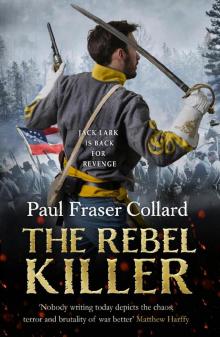 THE REBEL KILLER
THE REBEL KILLER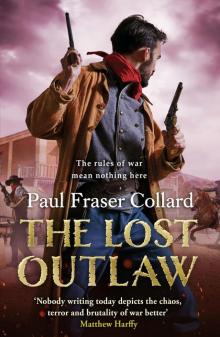 The Lost Outlaw
The Lost Outlaw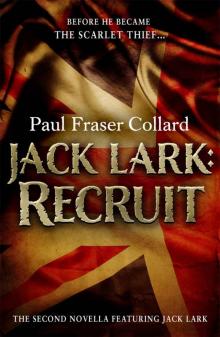 Jack Lark: Recruit (A Jack Lark Short Story)
Jack Lark: Recruit (A Jack Lark Short Story)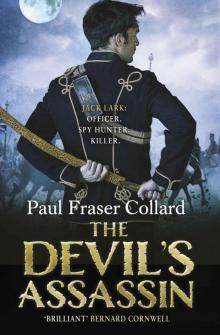 The Devil's Assassin (Jack Lark)
The Devil's Assassin (Jack Lark)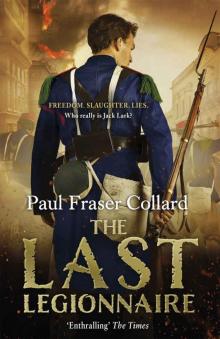 The Last Legionnaire
The Last Legionnaire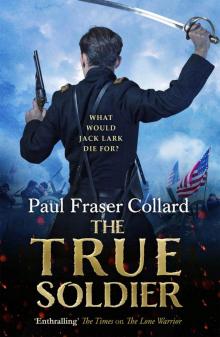 The True Soldier: Jack Lark 6
The True Soldier: Jack Lark 6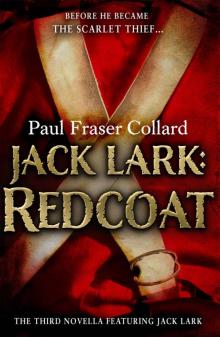 Jack Lark: Redcoat (A Jack Lark Short Story)
Jack Lark: Redcoat (A Jack Lark Short Story)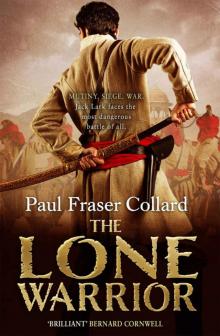 The Lone Warrior
The Lone Warrior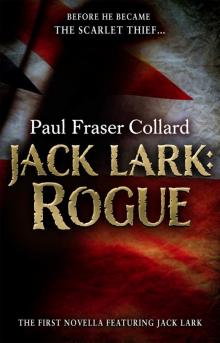 Jack Lark: Rogue
Jack Lark: Rogue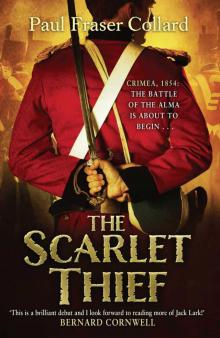 The Scarlet Thief
The Scarlet Thief